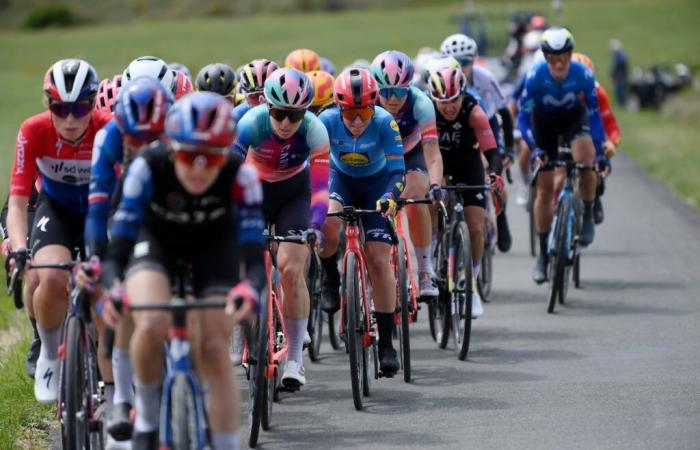Becoming a professional cyclist is a very difficult goal and that is up to very few, even more so if we talk about the female category. However, female Spanish cycling advances every year and with a firm step in its professionalization. Until 2023 more than 70% of the female platoon outside the World Tour charged less than 10,000 euros per year and 78% had to resort to a second job to add a decent salary, according to the annual survey of the cycling labor organization The Cyclist Alliance. Now, the Royal Spanish Cycling Federation (RFEC) imposes on all Spanish teams the obligation of a minimum wage for cyclists to participate in female competitions.
Before the entry into force of this measure on January 1, 2024, the women’s teams outside the World Tour were not recognized as professionals, which made it not consist of as a job, so the obligation of this minimum wage corresponds to a professionalization of the teams. These have to pay the minimum interprofessional salary imposed by the Government – currently 1,184 euros per month.
To mention this change in the rules of Spanish cycling, Skoda launched a short documentary called Double work in which he tells the stories of four cyclists who, even being professionals, had a second job. These are usea ostolaza, current champion of Spain and physiotherapist; Yurani Blanco, runner -up of Spain and children’s educator; Isabel Martín, cyclist and teleopeora; and Marta Romeu, cyclist and political. Through this five -minute piece, the cyclists expose the difficulties they have had to overcome until they reach the current level of professionalization and how the combination of two works conditioned their sports performance.
This measure had been applied before, but only to the teams that participated in the World Tour. Now, the continental category is included – the second of cycling. The new 2024 survey conducted by The Cyclist Alliance shows a small improvement in terms of the percentage of women who charge less than 10,000 euros per year and are 55%. Although there is still a way to go in this regard, Mavi García, cyclist of the Australian team Liv Alula and winner of several Spanish championships, points out that since he began in cycling in the female category, giant steps have been taken. “Since I started I think I have lived the evolution, luckily, very closely. In my beginnings things had nothing to do with how they are now and have changed a lot,” he explains to this newspaper.
The main change that Garcia stands out is that the visibility of cycling in which women compete have increased. “More expectation has been created and I think the most important thing is that the races have begun to televise. Now they are giving practically all World Tour races and there are many people who have the possibility of seeing them when they could not know before and that I think it has been a very important step to make us grow,” he says. It also highlights the importance of imposition of a minimum wage and the rise in salaries, in addition to the conditions of the cyclists in the equipment. “In my team, three more doctors were added last year, three nutritionists, fisios … we have everything shared with the boys. There are even assistants who rotate, some races are with them and others with us.”
However, the imposition of this minimum wage is a double -edged sword, as García points out. “I am in favor of imposing a minimum wage, but it is also dangerous for some teams because they can disappear, such as my first team, the Bizkaia Durango,” he says. Where many efforts have to be put is still to reduce the difference in the awards between the masculine and the female of some tests. “The prize depends a little on the organization. There are times that there is an abysmal difference and in others that is more equal. Little by little they are improving, but there are some careers that is ridiculous what they give us to us compared to what they are giving them to them.”
In 2024, the Women’s Tour awarded the winner of the race with 35,000 euros and with 1,300 euros each stage victory – with a bag of 137,380 euros. These numbers are very far from the 150,000 euros that the winner of the Male Tour and the 11,000 euros won by the winner of a stage. In addition, only eight stages were played in the female race, for the 21st of the male edition, which makes it more difficult to achieve a victory.
Also last year, the Tour de France female – the best paid race of the World Tour female – had a prize bag of 250,000 euros. The absolute winner wins 50,000 euros, the second classified 25,000 euros and the third 10,000 euros. The male category awards, however, are much higher with a 2.4 million euros bag. Tadej Pogacar, winner of the race last year, took 500,000 euros, twice the entire cyclist awards. And not only the difference is in the winner of the race, in the victories of the stages the difference is large too. For example, an individual stage victory on the Tour of France female gives a runner 4,000 euros. In the masculine, men earn 11,000 euros for a stage victory.
Although Mavi also adds that currently in cycling there are more and more opportunities for women: “There are many more opportunities for girls because many World Tour teams have other developments that neither did they exist for younger girls or for people who have a lower level.”
Although the situation of cycling has to continue advancing, Garcia says that right now he does not miss such essential things, although he does not conform to what was achieved. “All this is increasingly improving, but there is always a background that never seems to become the same with the other, but hey, I suppose it is still missing,” he concludes.
This Sunday, Mother’s Day, the Tour of Women’s Spain begins in Barcelona – from May 4 to 10 – and the difference between the awards for the awards is still the same. And despite the fact that female cycling continues to progress, step by step, cautiously and slowly, those steps are firm and safe.






